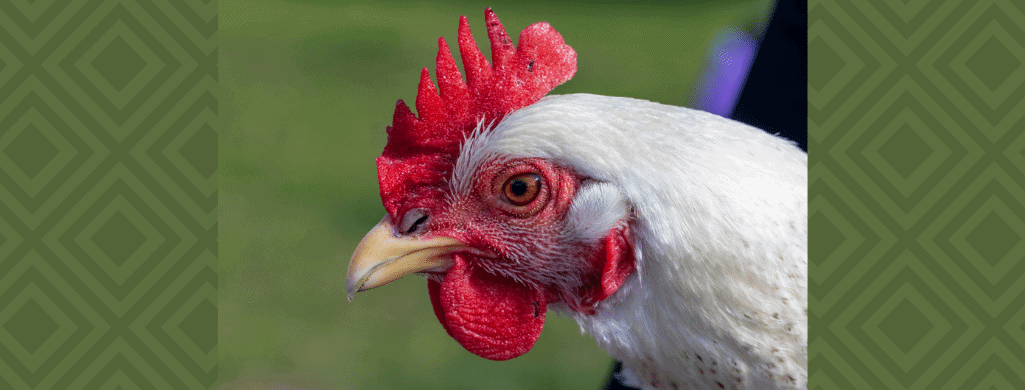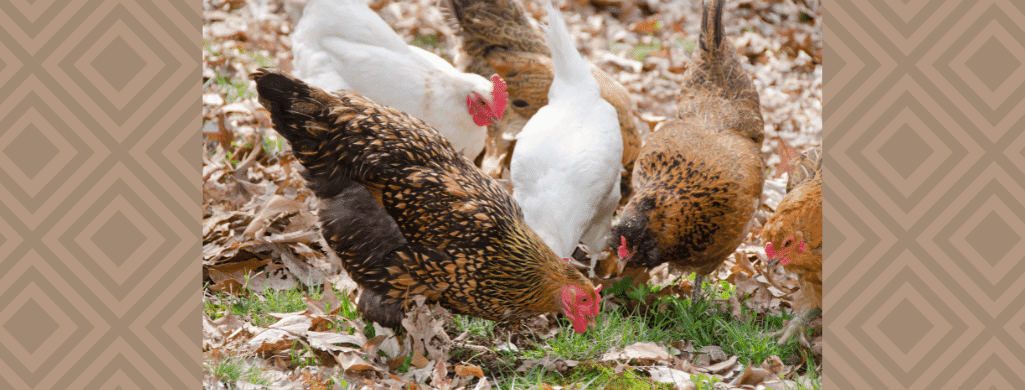Chickens who mature faster start laying eggs faster or are ready for processing sooner.
If you want to add Delaware chickens to your backyard flock, how long will it take before they are old enough to contribute?
Delaware chickens mature around 3 or 4 months. This is when they are large enough to harvest, and it is also the time when hens will begin breeding and laying eggs.
Keep reading to learn more about this fantastic breed, as well as how to care for them properly and how they do in a mixed flock.

Table of Contents
ToggleWhen Do Delawares Reach Full Size?
The Delaware chicken is a dual-purpose heritage breed.
This means they are both excellent egg layers and good meat birds.
They mature rather quickly. They reach a size large enough for harvest when they are about 3-4 months.
Female chickens can begin laying eggs as early as 16 weeks of age, but each individual hen is different.
It’s important to distinguish between the different bloodlines found in the Delaware breed.
While the overall bird is known as a dual-purpose breed, different breeders select for certain traits.
Some hatcheries and breeders focus on egg production.
Others focus on the meat production side. There are even ones who focus on looks to show these beautiful birds.
The bloodline of your Delaware will determine how quickly it matures in each area.
One focused on meat won’t start laying as early as one focused on Delaware egg production.
Likewise, a bird meant mostly for eggs won’t reach full size as quickly as a meat bird.
Once they reach their full size, this is their market weight:
- Pullets: 5.5 pounds
- Hens: 6.5 pounds
- Cockerels: 7.5 pounds
- Cocks: 8.5 pounds
Delaware Hens’ Egg Production
The Delaware chicken is a prolific egg layer. These eggs are large in size and light brown in color.
They average 4 eggs per week, which comes out to at least 200 eggs per hen per year.
As these hens age, their egg production will reduce by about 10% yearly. However, their average lifespan is 6 to 7 years.
Overall, this leads to a large number of eggs over their lifetime.
Delaware hens do not have a tendency to go broody.
If you are only looking for egg production, this is great. If you want to grow your flock, use an incubator or a broody hen from another breed.
Related Post: Do Delaware Chickens Make A Lot Of Noise?

Caring for Delaware Chickens
This breed loves to free-range and search for food. Offer them some feed throughout the day to ensure they get a comprehensive diet.
They typically don’t need a lot of fancy supplements or treats, but they will appreciate them!
With their inquisitive nature, these active birds will find plenty of bugs, nuts, and seeds while roaming around outside.
Also, offer a good, clean house for your amazing birds overnight. It is important you keep it free of debris or any dangerous items in their coop or nesting box.
These curious birds will pick and peck through everything, so they are in danger of trying to swallow anything they find.
They are good at spotting predators and other animals, though.
Make sure the coop has at least 10’ square feet per bird. These are larger birds, so they require more space than smaller breeds.
If there is not enough space, chickens are more likely to fight and bully each other.
This breed is healthy and low maintenance overall, but they do have a few issues.
They don’t have issues with circulation or lung problems, which are common among other fast-growing broiler birds.
Their fast maturity when it comes to laying can cause problems. Early laying and high laying rates often lead to issues with their reproductive system down the line.
Unfortunately, this breed also suffers from some feather problems.
This depends on the bloodlines, which we talked about earlier. Birds bred for show have nicer feathers and fewer issues.
Feather issues are common among many broiler breeds, which is not surprising. Delawares mature quickly, which means they also feather quickly.
Since meat chickens need to be plucked, their feathers are loose and less dense.
However, this means your chickens are more prone to feather damage. This can happen from breeding, bullying, or picking at parasites.
Missing feathers cause problems in extreme weather. Without full feathering, it is harder to stay warm.
Related Post: Do Delaware Chickens Handle Heat Well?
On the flip side, bare skin is prone to sunburn during the warmer months. Take special care of any birds with missing feathers during these weather extremes.

Do Delaware Chickens Get Along with Other Breeds?
While these larger birds look intimidating, they are a friendly breed of chicken. They are very curious, so they will follow their poultry owners around.
They are a little less friendly within the flock. They do not bully, but they spend most of their time alone or with their own breed.
Overall, they are gentle white birds who just want to explore.
Because they are not aggressive, they may be picked on by more aggressive breeds. If you add them to an existing flock, take stock of your bullies.
They may not accept the new birds.
If you want to add another breed to an existing flock of Delawares, choose another friendly, gentle breed with similar qualities.
Are Delaware Heritage Chickens Rare?
Back in the day, Delaware was one of the top breeds of American chicken in commercial poultry meat production.
As we talked about, their fast maturity and quick feathering helped them reach this spot. They also are tasty birds. This is partly due to their foraging nature.
As time passed, the commercial broiler industry focused less on free-range poultry.
Delawares do not do well being fully cooped up, so they were no longer a good option. Their total numbers declined because of this.
They were almost on the brink of extinction. Conservation efforts have brought their numbers up.
They are still on the watch list of the Livestock Conservancy. Not all hatcheries supply them because of limited breeding stock.
Some hatcheries will still refer to them as having a critical status, but it has greatly improved.
How useful was this post?
Click on a star to rate it!
We are sorry that this post was not useful for you!
Let us improve this post!
Tell us how we can improve this post?
